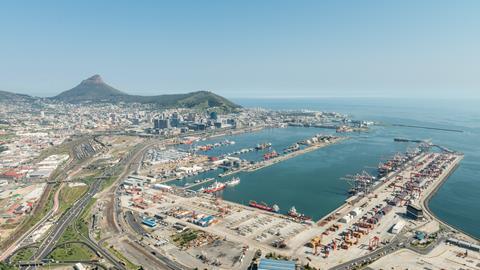Delays in South African ports have blighted the country’s fruit export business, which finds itself almost powerless to intervene
When writing about logistics problems and their potential resolution, the metaphor that writers usually reach for is the light at the end of the tunnel. But if fruit exporters in the Western Cape do currently see any such thing during these dark days for South African ports – by no means certain in a country where blanket power cuts are frequent – then it’s a rather faint light at best.
The story of Cape Town’s stumbling, wind-buffeted port logistics operation is already well reported. But for those that missed it, here is a mercifully brief summary: someone in the upper echelons of the South African government forgot to allocate enough budget for simple, sensible investments like cranes that don’t blow over in the city’s recurring high winds. An oversimplification, I agree. But you get the picture.
Antoinette Van Heerden, logistics manager at the South African Fresh Produce Exporters’ Forum, is not paid to defend state-owned operators Transnet and Transnet Port Terminals, which runs the Cape Town Container Terminal. In fact, her role is to criticise it constructively and to make recommendations for the kind of investments that might lift South Africa’s ports off the very bottom rungs of the World Bank’s latest Container Port Performance Index.
So the fact that Van Heerden sees some of that symbolic light at the end of that figurative tunnel of incompetence offers a sliver of hope for those fruit exporters who spent much of their Christmas break distracted by updates on the glacial progress of their consignments out of Cape Town Container Terminal.
“What we need from Transnet is a lot of new equipment,” she tells Eurofruit. “We want to see more mobile and short cranes to help [private fresh produce logistics operator] FPT. We are also encouraged by news of a train link to the planned Belcon Maersk coldstore and warehousing depot, which is under construction, as well as plans for other facilities in Culembourg and Worcester. In short, we are happy with the progress we are seeing.”
But of course, logistics being what it is, the new equipment won’t land in the port overnight. In fact, it may not appear for another couple of years, Van Heerden admits. “Hopefully 2025 onwards,” she suggests. “In the meantime, we will micromanage ourselves through the season.”
Fhumulani Ratshitanga, CEO of industry body Fruit South Africa, sums up the need for action: “Our fruit industry is a significant contributor to the country’s stability and development. So there is a real need for joint efforts to address the various bottlenecks faced by exporters.”
How long it is before things improve remains to be seen. And with rumours of deeper financial problems at Transnet, there could be some very strong headwinds to come.




